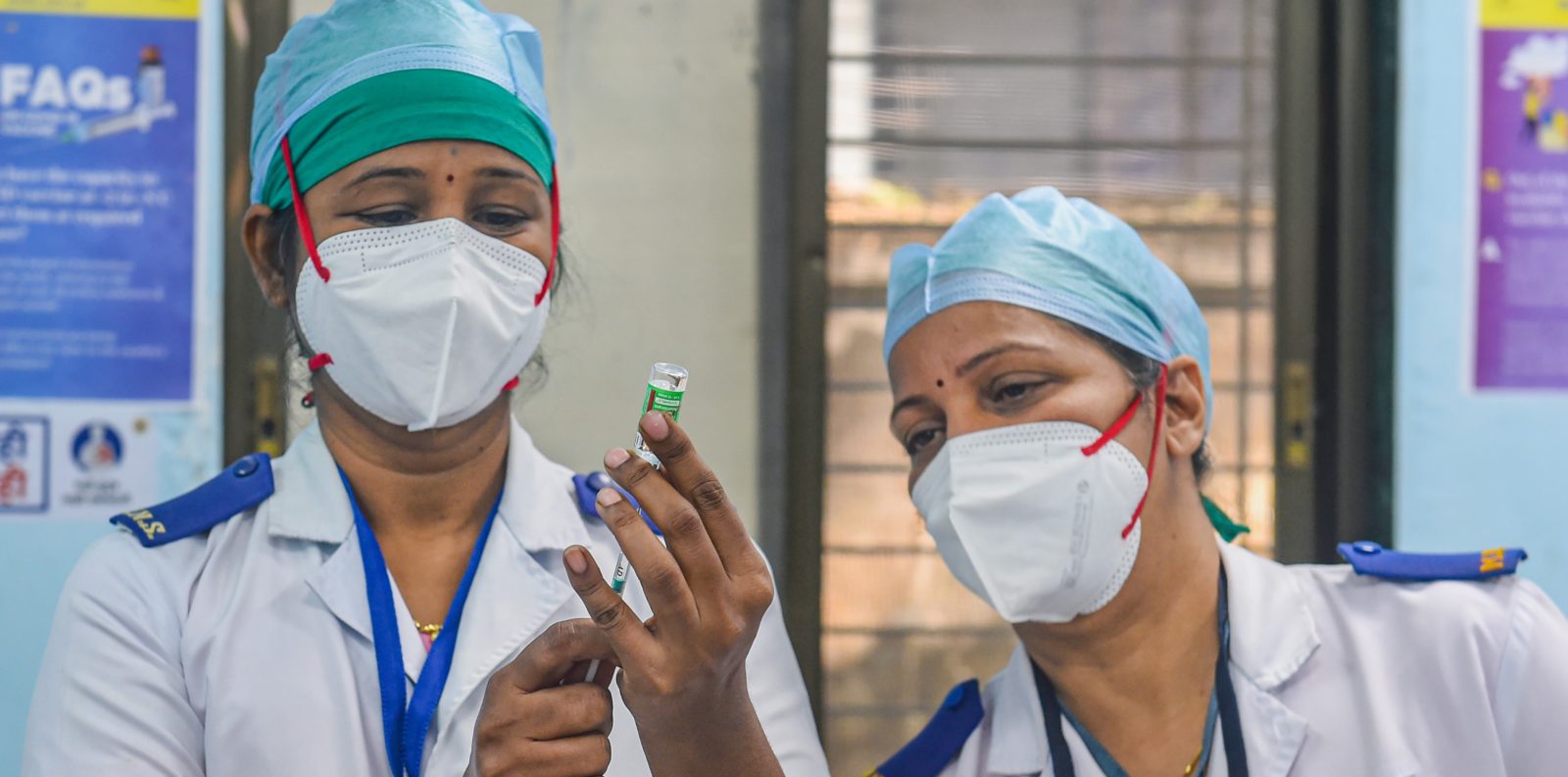
A nurse fills a Covishield dose in an injection before administering it to a frontline worker at Rajawadi hospital, Mumbai, January 16, 2021. Photo: PTI/Shashank Parade
- A hospital in Kottayam declared a 31-year-old woman dead two weeks after her first dose of Covishield.
- However, the hospital hadn’t conducted an autopsy, and Kerala’s health department is awaiting the results of one.
- Cerebral venous thrombosis is a rare type of stroke, and reports of its occurrence in Europe earlier this year had stalled the rollout of the AstraZeneca vaccine there.
Bengaluru: The health department in Kottayam, Kerala, is awaiting a longer report on the death of a pregnant woman aged 31.
A controversy has erupted around her demise because the hospital she was being treated at has said that she died of cerebral venous thrombosis (a form of stroke) and vaccine-associated thrombocytopenia (low blood-platelet count).
These two conditions are very rare effects that experts in Europe prominently considered could be associated with the AstraZeneca COVID-19 vaccine, earlier this year.
On August 6, Mahima Mathew received her first dose of Covishield, the name of the AstraZeneca vaccine in India, at the Mar Sleeva Medicity, a hospital in Pala, a town in Kottayam district. On August 15, she reportedly developed a severe headache and was admitted to the same hospital.
The next day, according to Indian Express, the hospital declared her to be brain dead, and confirmed her death on August 20. However, Mar Sleeva Medicity did not conduct an autopsy.
The woman’s husband has written to state health minister Ranjith K. demanding a probe into her death, noting that the health department had said pregnant women could take Covishield.
Kottayam district medical officer has expressed doubts about how Mar Sleeva Medicity linked Mahima Mathew’s death to the vaccine without an autopsy. The husband has also said that he wasn’t happy with treatment at the hospital, Indian Express reported.
When a person develops debilitating conditions or illnesses after taking a vaccine, the condition or illness is called an adverse event following immunisation (AEFI). AEFIs include death, but there is a difference between death after vaccination and death due to vaccination.
The Union health ministry’s Immunisation Technical Support Unit made a presentation on March 31, 2021, that said 180 people had died in India after taking COVID-19 vaccines. However, complete case reports were available for only 35 of them, it continued.
The National AEFI Committee, which received the presentation, finally deliberated on 10 of these deaths. They were all among recipients of Covishield.

Public health researcher Malini Aisola had said at the time that in around 60% of cases for which ministry experts had completed causality assessment, autopsies had not been conducted.
However, local authorities have often been quick to deny links between deaths following vaccination to the vaccines themselves, which shouldn’t be possible without autopsy reports. The opposite could be true, too: it’s also hard to admit a link without an autopsy.
According to Johns Hopkins Medicine, “Cerebral venous sinus thrombosis occurs when a blood clot forms in the brain’s venous sinuses. This prevents blood from draining out of the brain. As a result, blood cells may break and leak blood into the brain tissues, forming a haemorrhage.”
As of March 31, 2021, Germany’s Robert Koch Institute said that 31 cases of cerebral venous sinus thrombosis had been reported among 2.7 million recipients of the first dose and 767 recipients of the second dose of the AstraZeneca vaccine, in Germany.
Germany had paused the rollout of the AstraZeneca vaccine after comparing this rate to the historical rate: 2-5 cases per million population per year. (However, a study from Australia subsequently reported that the ‘natural’ rate may have been underestimated.)
Subsequently, after the European Medicines Agency said it couldn’t find a link between the blood clots underlying thrombosis, and repeated that the vaccine’s benefits outweighed its risks, Germany and other countries resumed its use.
On June 14, CNN-News18 had reported that overall, 26,200 AEFIs had been reported in India relating to the COVID-19 vaccines, at the time amounting to 0.01% of doses administered. It also said 94% of these adverse events were among Covishield recipients.
India has thus far acknowledged only one vaccine-related death – in mid-June 2021 – and that too of anaphylaxis, or a severe allergic reaction to the vaccine’s contents.
While some experts have said the number of deaths could be higher, on par with rates reported from around the world, the National AEFI Committee submitted a report to the Union health ministry in May 2021 that said otherwise:
“AEFI data in India showed that there is a very minuscule but definitive risk of thromboembolic events. The reporting rate of these events in India is around 0.61/million doses, which is much lower than the 4 cases/million reported by UK’s regulator Medical and Health Regulatory Authority (MHRA). Germany has reported 10 events per million doses.”

